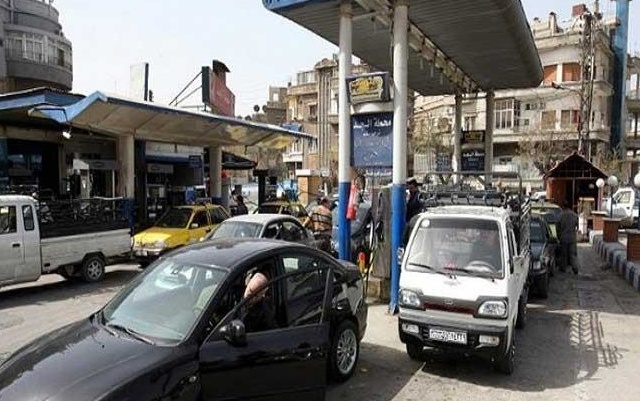Syrians queue at a petrol station amid crippling shortage, April 2019
Transport in Assad regime areas of Syria has ground to a halt because of petrol shortages, following the cut-off of Iran’s essential line of credit.
Reliable sources in Damascus have confirmed to EA that videos of miles of vehicles parked and waiting are genuine. Public transport, which is run by private companies, as well as individual motorists is affected.
One academic in the Syrian capital said he had not been at work this week, unable to travel more than 5 km to Damascus University.
After eight years of conflict, reducing Syria’s GDP by 75%, the crisis has been spurred by the halt of Iran’s supply.
Tehran has propped up the regime since 2012 with billions of dollars in lines of credit. However, facing its own economic problems and comprehensive US sanctions, the Islamic Republic stopped the support on October 15.
The regime newspaper Al-Watan said no oil tanker has reached port since then.
Regime officials met private sector importers at the start of 2019, asking them to obtain contracts, but these were blocked by “logistical measures”, said the newspaper.
Making no reference to Iran, regime officials have tried to blame US sanctions on the regime. Other pro-Assad outlets have spread false stories that the US has threatened to attack any Iranian tanker travelling to Syria, or that Egypt has stopped passage through the Suez Canal. The Egyptian Government has denied the claim.
Al-Watan said Syria needs 4.5 million litres (1.2 million gallons) of gasoline and 6 million litres (1.6 million gallons) of diesel each day, costing the regime $8 million daily.
With most of Syria’s oilfields in Kurdish-held territory, output in regime areas is only 24,000 barrels per day. The country needs 136,000 barrels of oil per day, Al-Watan wrote.
It claimed the Oil Ministry is trying to establish supplies from northern Syria, without saying how this would be arranged with Kurdish factions.
There has been some trade between Kurdish and regime territory, but Assad and his officials have also threatened to recapture the 27% of Syria held by the Kurdish groups.
Al-Watan said rationing was necessary in “the coming period” while the regime was “following up on the Iranian credit line”.
The Iranian regime has made no comment about the petrol situation. Foreign Minister Mohammad Javad Zarif saw Bashar al-Assad in Damascus on Tuesday, and discussed economic issues with Turkish leaders on Wednesday.
See Syria Daily, April 18: What Did Iran’s Foreign Minister Tell Turkey?
Syria Daily, April 17: Assad Hosts Iranian Foreign Minister Zarif
Rationing and Surveillance
Following shortages of gas canisters, necessary for heating and cooking, the regime have instituted a system of “smartcards”.
Buyers have to present the cards, similar to a bank debit card, each time they purchase petrol or gas. Private cars are allowed 20 liters each five days, motorcycles three liters in five days, and public taxi cars 20 liters every 48 hours.
The measure has helped ease the gas crisis and the long queues of Syrians waiting for supplies. It has also helped the regime in its surveillance and pressure on the population.
Any person on the regime’s “wanted” list, such as failure to report for military service, is denied a card and thus the possibility of purchasing essential fuel.


The Kurds selling oil to the Baath Party is suicide. They will use that oil for tank and her fuel to slaughter them.
The Baathists have less than a fith the oil they need. I don’t see how this can continue long term for them.